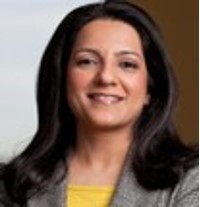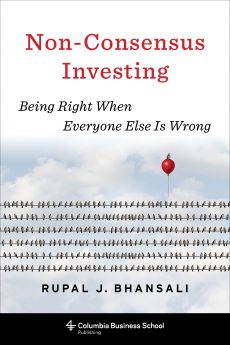
About the Author
“Global Equities Leader of the Year”
Bonhill Group, 2022
“Legendary Contrarian”
CNBC, 2019 to 2021
“Top 100 Women in US Finance”
Barron’s 2020, 2021 and 2022
“Unconventional Thinker”
Wealth Track, 2017
“Global Contrarian”
Barron’s, 2015
“Global Guru”
Forbes, 2009
My upbringing, career and investment approach can all be described in one word – “Unconventional”.
Unlike most kids, who grow up hearing fairy tales, I grew up on stock stories. My dad owned a stockbroking business and I heard him talk to his clients from home. I was enthralled with markets and couldn’t wait to get started. By the age of 16, I had mastered accounting and straight out of high school, I took any finance job I could lay my hands on – from the foreign exchange desk at Citibank to the corporate finance and leasing department of a merchant bank. By the time I was 24, I had edited prospectuses, calculated residual values on leasing portfolios and learned how to read balance sheets. I know that’s hardly scintillating stuff – but I was drinking from a fire hose and it felt exhilarating at the time.

Unlike most overprotective parents, mine gave me the space and freedom to make my own decisions and think for myself. It must have been hard for them to do the opposite of what every other parent was doing at the time. But thanks to their enlightened upbringing, I find it very easy to not seek or need approval and take ownership of my decisions and actions. My parents did not shield me from the rough and tumble of the real world – they made me face it. Little did they know how well it would prepare me for my tough profession where one’s caliber and character are constantly battle tested through the myriad market ups and downs. Amen to such unconventional parenting.
My tryst with challenging conventional wisdom started in college. I noticed students chose the path of least resistance and went job-hunting instead of considering entrepreneurship as a path to success. So to make them think about this non-consensus alternative, I launched a competition called “Mind Your Own Business” where students presented their business plan to corporate CEOs.
Eschewing the easy route of joining my family business in India, I dared to immigrate to America – the financial heartbeat of the world – where I could practice money management as a profession. I knew that if I could generate better returns for a person’s pension or a university’s endowment, I get to make a difference, not just a living! Few vocations get more fulfilling and rewarding than that.
My professional career trajectory has also defied convention. Unlike most long – only managers, my money management career began on the long-short side, at the hedge fund, Soros. This unusual formative experience, taught me how to think about both – the long side of the trade and the short side of the trade. This has since become the signature element of my upside-down investment approach – one which focuses on what can go wrong, not just what can go right.
But perhaps the most uncommon aspect of my career is that I succeeded in a competitive, male dominated profession. Fewer than 10% of professional money managers are women. I am living proof that the glass ceiling can be broken. It is why I wrote this book – to show you how you can accomplish what I have – and to salute what my brother once told me (as only siblings can!): if you can do it, anybody can do it. (I think he meant to say the opposite: “if anybody can do it, you can do it” – but I like the way it came out..!)
You might think that my life has been one linear ride up – it has been anything but.
When I switched gears to managing money as opposed to broking stocks, I had to take a 50% pay cut while my husband was studying and not collecting a paycheck. It wasn’t easy to walk away from the big bucks, but I knew it was the right move. It has been among my best decisions ever.
I have risked getting fired multiple times by my employers or my clients (and sometimes both!) for not owning the flavor of the year and underperforming my peers. What I have learned is that when you care about your work more than your job, life has a way of working out. Over the years, I have found employers and clients who celebrate the way I manage money instead of denigrating it.
They say there is nothing worse than being poor. I disagree. The worst thing is being poor after you have been rich. Growing up was a roller coaster ride on the money train – as many wrecks as riches. This is why I pay so much attention to not losing money, instead of simply making it. Capital preservation and capital appreciation get equal attention from me – this is what makes me a very different money manager and frankly, is the biggest secret to my success.
Critical Acclaim
“Global Equities Leader of the Year”
Bonhill Group, 2022
“Legendary Contrarian”
CNBC, 2019 to 2021
“Top 100 Women in US Finance”
Barron’s 2020, 2021 and 2022
“Unconventional Thinker”
Wealth Track, 2017
“Global Contrarian”
Barron’s, 2015
“Global Guru”
Forbes, 2009

Throughout my life, I have been enlightened by other people’s wisdom or inspired by their points of view – often by reading their books. Books have been among my finest teachers – my passport to transcend time and space and to learn from the best of the best.
By only reading but not writing, I feel I have taken but not given. Society and I owe a great debt to authors. If I can repay in some small measure to all those before me, I will feel my burden lightened. This is why I am writing a book on the power and payoff on “Non Consensus Investing”, in which I reveal my secrets to investment success.
A book changed my life. I hope this changes yours.
We live in a world of low, no or negative returns. The need for higher returns and lower risk has never been greater, yet few asset classes or investment strategies offer either let alone both. The solution is not to give up on these goals, but to change the means of achieving them. This book talks about those means – a game changing investment discipline that I have honed over a career spanning twenty-five years, managing multi-billion dollar global equity portfolios for sophisticated investors ranging from pension plans to university endowments. This discipline has produced investment results that would make anyone proud. Not only has it delivered superior absolute and relative returns, it has done so with lower risk. However, applying this discipline is neither easy nor intuitive, but this book will show you how it is rewarding and right.
Reading this book will help you make the transition from consensus to non-consensus thinking and from conventional to unconventional money management, to achieve the holy grail of higher returns and lower risk. As my clients and colleagues will attest to, this mental pivot is worth the monetary payoff.
